ARLINGTON, Va. — Legalizing recreational marijuana use in Colorado, Oregon and Washington has resulted in collision claim frequencies that are about 3 percent higher overall than would have been expected without legalization, a new Highway Loss Data Institute (HLDI) analysis shows. This is HLDI’s first report on how marijuana legalization since 2014 has affected crashes reported to insurers.
More drivers admit to using marijuana, and it is showing up more frequently among people involved in crashes. Though there is evidence from simulator and on-road studies that marijuana can degrade some aspects of driving performance, researchers haven’t been able to definitively connect marijuana use with more frequent real-world crashes. Some studies have found that using the drug could more than double crash risk, while others, including a large-scale federal case-control study, have failed to find a link between marijuana use and crashes. Studies on the effects of legalizing marijuana for medical use also have been inconclusive.
Colorado and Washington were the first states to legalize recreational marijuana for adults age 21 and older with voter approval in November 2012. Retail sales began in January 2014 in Colorado and in July 2014 in Washington. Oregon voters approved legalized recreational marijuana in November 2014, and sales started in October 2015.
HLDI conducted a combined analysis using neighboring states as additional controls to examine the collision claims experience of Colorado, Oregon and Washington before and after law changes. Control states included Idaho, Montana, Nevada, Utah and Wyoming, plus Colorado, Oregon and Washington prior to legalization of recreational use. During the study period, Nevada and Montana permitted medical use of marijuana, Wyoming and Utah allowed only limited use for medical purposes, and Idaho didn’t permit any use. Oregon and Washington authorized medical marijuana use in 1998, and Colorado authorized it in 2000.
HLDI also looked at loss results for each state individually compared with loss results for adjacent states without legalized recreational marijuana use prior to November 2016.
Data spanned collision claims filed between January 2012 and October 2016 for 1981 to 2017 model vehicles. Analysts controlled for differences in the rated driver population, insured vehicle fleet, the mix of urban versus rural exposure, unemployment, weather and seasonality.
Collision claims are the most frequent kind of claims insurers receive. Collision coverage insures against physical damage to a driver’s vehicle in a crash with an object or other vehicle, generally when the driver is at fault. Collision claim frequency is the number of collision claims divided by the number of insured vehicle years (one vehicle insured for one year or two vehicles insured for six months each).
credit:iihs.org











